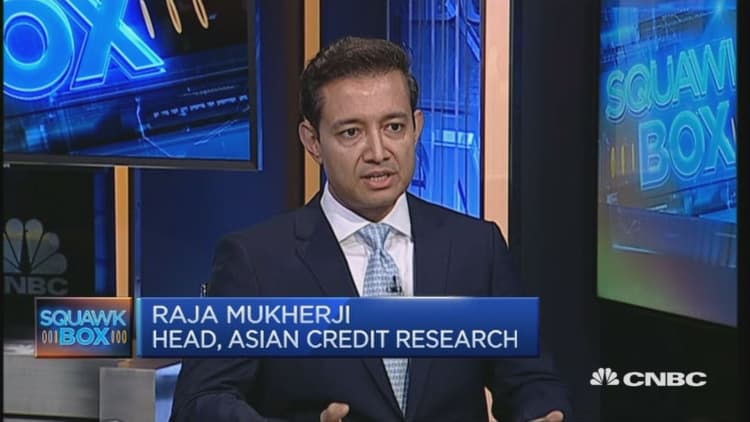
Increased defaults in China's corporate bond market - generally held to be positive because it improves transparency - could actually send investors running for the hills, analysts have warned.
Financial commentators have a common refrain: China needs to allow more defaults in its bond market in order to fix the mispricing of risk. But that would see many issuers stripped of their investment grade ratings, analysts at Daiwa said.
"The long-held assumption is that, if companies, especially state-owned enterprises (SOEs), had trouble paying back creditors, the central government would have their backs," Daiwa said in a note. "Hence, SOE credit ratings are more or less equivalent to sovereign ratings."
That was one reason 63 percent of corporate issuers in China had bonds rated AA or above, the bank said in the Tuesday note. And it was not just that a lot of those issuers would lose that status if the government allowed defaults, Daiwa noted.
"Without implicit protection from the government, investors could simply flee the market altogether, especially when market transparency was already low," it said.
Daiwa expects pressure in the bond market to rise, especially as bond redemptions peak over the next 12 months. It said that there have been 22 bond defaults in China's domestic bond market so far this year, as many as in 2015.
Market players have generally held that allowing more defaults would be a positive move.
"We welcome default," Raja Mukherji, head of credit research for Asia at Pimco, told CNBC's "Squawk Box" on Wednesday. He noted that China's corporate bond market had tripled over the past five years to about $2 trillion out of a total mainland bond market of $8 trillion, making it the world's second-largest bond market.
"We think the government should allow more defaults and they should actually [minimize] the moral hazard put that they have embedded into the corporate bond market."
Pimco has been selectively looking at China's offshore U.S. dollar bond market, Mukherji said, adding that Pimco's focus was on sectors that may be shielded from default because they would likely continue to receive government support.
"What we focus on are those sectors that are going to get ongoing support from the state even as China transforms from an industrial to a consumer consumption driven economy," he said. "Those sectors would be oil and gas, transportation, consumer, internet."
But Daiwa noted that there are hazards to removing the government backstop, in addition to the hazards of keeping it.
The only way for the government to "save credit at all costs" from defaults would be to print more money, Daiwa said, noting that would pressure .
That, combined with likely interest rate cuts, would cost China's market the yield advantage that currently attracts investors, and could spur "significant" fund outflows and a "downward spiral" for the yuan, Daiwa said. Daiwa assigned a 30 percent probability to that scenario.
But Pimco expected China to continue to stage-manage the bond market.
While the market needed to prepare for more defaults, "the government has the will and the willingness to control the default cycle," Mukherji said. "So I think that will be a slow moving process. It will take years before a full default cycle comes."
Moody's has also said it did not expect a major credit blowup, but predicted some bumps in the credit market.
"The overarching role of the Chinese state mitigates the risk of a financial crisis," it said in a note Thursday. "Even in the absence of a systemic crisis, major imbalances created by rapid debt accumulation are likely to erode credit quality over time."
It noted that it holds a negative outlook on China's sovereign rating, the majority of rated Chinese issuers and the country's banking sector, citing the "substantial dead-weight cost" to the economy from the country's debt overhang.
Follow CNBC International on Twitter and Facebook.
—By CNBC.Com's Leslie Shaffer; Follow her on Twitter @LeslieShaffer1




